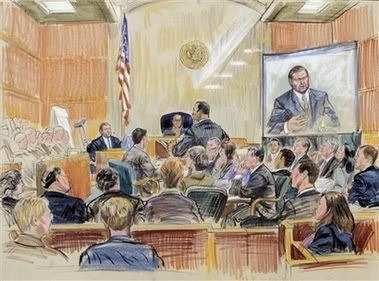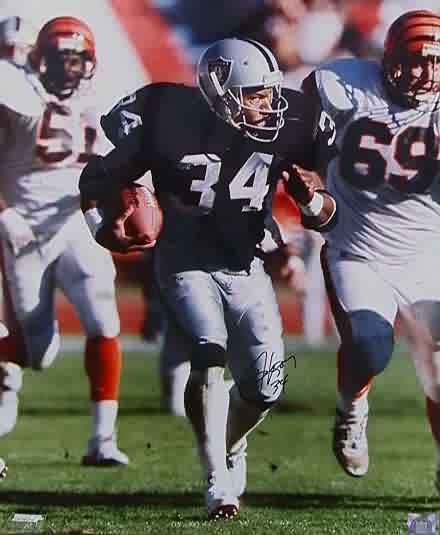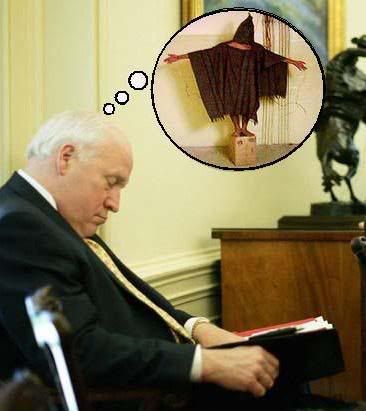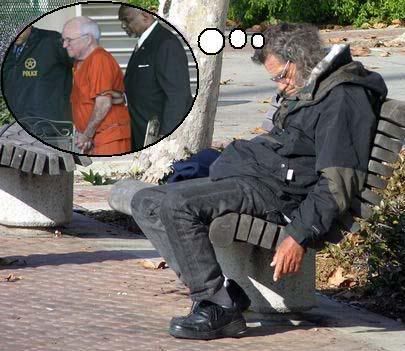Doesn't Cheney quickly leaving the base where he was a target embolden the enemy and at the same time hurt troop morale for all those soldiers who can't just pack up a get the hell out of harms way?
Shouldn't Dick just stay put - fight them over there so we don't have to fight them over here?
Tuesday, February 27, 2007
Great Gore Op-Ed
Richard Cohen has a must read Op-ed in today's Washington Post about Al Gore.
Here is how it begins:
Now, somebody ought to make a movie about Al Gore. I would call it "An Uncomplaining Life."
The movie would be about a man who did not quit, who came off the canvas after a painfully close election -- he won the popular vote, after all -- who accepted defeat graciously and tried to unite the nation, who returned to the consuming passion of his earlier days, the environment, and spoke endlessly on the topic, almost always for free, who starred in a documentary based on his speech and who Sunday night, before a billion or so people, won an Academy Award for his effort. This may or may not be a stepping stone to the presidency, but Gore gives us all a lesson on how to live one's life.
Here is how it begins:
Now, somebody ought to make a movie about Al Gore. I would call it "An Uncomplaining Life."
The movie would be about a man who did not quit, who came off the canvas after a painfully close election -- he won the popular vote, after all -- who accepted defeat graciously and tried to unite the nation, who returned to the consuming passion of his earlier days, the environment, and spoke endlessly on the topic, almost always for free, who starred in a documentary based on his speech and who Sunday night, before a billion or so people, won an Academy Award for his effort. This may or may not be a stepping stone to the presidency, but Gore gives us all a lesson on how to live one's life.
Wednesday, February 21, 2007
Libby Trial: Defense Counts on Jurors’ Imagination

Here’s my favorite line of the Defense closing argument, as blogged by Emptywheel, from lead Libby attorney, Ted Wells, when he began to whine about not getting to have the last word (with my emphasis):
Fitzgerald goes last. But I will tell you, and say to you now, there's an extreme disadvantage to Defense, because you're not able to respond to something that will come up. I don't get to respond, but this is an important trial, and I represent an important person, so I want you to think about how I would respond. I want you to be critical thinkers. If you hear something that is new, I want you think, what would Wells and Jeffress say that is new.I don’t believe that “critical thinking” is the skill Wells is really lobbying for here. He might as well have said:
“If Fitzgerald makes an argument that is better reasoned and more compelling than the one we have given you, I want you to hallucinate the image of Wells and Jeffress giving an even better argument!”
There also seemed to be quite a bit of ego stroking in the Defense argument yesterday. In addition to reminding the jury that he represents “an important person,” Wells made a strange point of complimenting his partner:
We saw what was in essence a Perry Mason moment when my partner Bill Jeffress, one of the best lawyers in the country . . .Frankly, if I’m a juror, this line feels a bit like watching a Broadway play and having one of the actors suddenly tell the audience that his co-star deserves a Tony Award for being one of the best actors in the country.
Let’s just say that I would be very reluctant to give a glowing review of that play, no matter what else I heard during the performance!
Wednesday, February 14, 2007
Libby Trial: Defense Covers the Pass, While Fitz Runs Up the Middle!

The first day of Scooter Libby’s defense seemed kind of odd. After nearly two weeks of hearing a nice clean prosecution case that basically ran the “Libby lied” theme down the defenses throat, Libby’s team blew through 7 witnesses on the first day while trying to show that Libby wasn’t leaking to every reporter he talked to. It was as if they were trying to defend all over the field, when the offense had not even bothered to throw a pass!
Fitzgerald, sensing that the defense was playing against a phantom game plan, simply let the defense witnesses pass through with only token cross-examination. One witness wasn’t asked any questions at all, while another got only one question. Even Bob Novak, whose defense testimony seemed ripe for shredding, was let off the hook with only about six or seven questions.
Basically, Fitzgerald didn’t seem to care if the defense proved Libby wasn’t leaking to everyone, or even that he wasn’t the primary leaker! Libby was indicted for lying! He was indicted because he was the one who “made up a story” to hide the connection between the leaking (regardless of who was doing it) and Dick Cheney - presumably at the behest of Cheney.
Any other defense witnesses besides the two men who were directly involved in the decision to lie about this connection - Libby and Cheney - are mere distractions to be moved in and out as fast as possible, in order to keep the government’s case fresh in the mind of the jurors.
The second day of defense started much like the first day, as the leadoff witness was in and out in a flash with only one question during cross examination.
But then, John Hannah, Cheney’s current National Security Advisor, was brought in essentially as a “surrogate” for both Libby and Cheney, as he was asked to describe both Libby’s pattern of forgetfulness and his intense, all-consuming involvement and in critical national security issues (the ones he could remember anyway) that made the issue of "Wilson's wife" unimportant. Finally, here was a chance for Fitzgerald to tear into a key defense witness!
But even here, Fitzgerald’s response was swift and precise (as blogged by emptywheel, with my comments in brackets):
Fitz: Scope of [Chief Of Staff] as you understood it. Part of it was to protect OVP and VP from public criticism.Game over! After that, the Libby team decided to pack it in, announcing that neither Libby or Cheney would testify, and that the defense would rest its case after only a few minor pieces of supplemental evidence were admitted.
Hannah: It's not the formulation I would use, Need to go out and truthfully defend office from unfair criticism.
Fitz: Especially important if it was directed at integrity of VP or OVP, and integrity of Admin, OVP, VP, in terms of Iraq.
Hannah: It would be important pushback, yes.
Fitz: Best time to see Libby was evening, particularly if you focus July 6. Fair to say during that week, if you said tomorrow morning take an hour or two to go out for coffee, he wouldn't take that time.
Hannah: It would be harder.
Fitz: If he gave someone [cough, Judy Miller, cough!] an hour or two, it was something Libby thought important.
Hannah: WRT me, yes.
It didn’t seem like much of a defense, and it wasn’t – if the goal were to get Libby acquitted. But with the possibility of a pardon down the road, most experts see appeals dragging until the very end of Bush’s current term. And expect even more White House comments like “I'm not going to comment on the process of an ongoing
Saturday, February 10, 2007
How Dick Cheney’s Dreams Differ From Other Peoples' Dreams!


Note: The "Sleeping Cheney" image was created about 10 months ago, while the "Sleeping Man" was created today - using a "Cheney in Prison" inset respectfully swiped from the brilliant Dood Abides.
Sunday, February 04, 2007
Libby Trial: The Adventures of Scooter the Squirrel!

Looking back at my (seemingly ancient) times as a high school debater, I remember a term for a strategy occasionally used by lazy or overmatched competitors when they had to debate the “affirmative” side of a policy issue. It was called a “Squirrel Case.” Very roughly described, it consists of taking a position so obscure and unexpected that even a meticulously prepared opponent would have done no research that would help rebut any element of the proposal.
My debating partner and I often happened to fall into the “lazy or overmatched” camp, but we were quite successful on the affirmative side with a “squirrel case” related to Prison Reform (the official debate topic for my junior year). In our proposal, we argued for a treatment regimen for convicted violent offenders based on the combined use of chemicals (such as sodium pentathol) and intense hypnosis, a la “A Clockwork Orange,” in order to completely eliminate the need for incarceration.
Because we didn’t do any substantial research into potential arguments for the “negative” side, we routinely got our rear-ends handed to us by scrawny, bespectacled geeks with enormous filing cabinets full of material, but their files didn’t help them much when we were lucky enough to draw the affirmative!
One week into the Scooter Libby trial, I am starting to suspect that the Libby team may be trying the equivalent of a “squirrel case,” instead of the vaunted “faulty memory defense” that has been their more public strategy, and the one that Fitz has clearly built his case to overcome.
During a lengthy argument before Judge Walton on Thursday, Fitz lobbied to be able to show video of Scott McClellan press conferences about Libby, and he repeatedly referred back to one of the big surprises of Wells’ opening statement. From Emptywheel’s play-by-play:
Fitz. For Wells to argue that this is about Libby being thrown under the bus, when that's not in the GJ, and this is, then why can't I do that.And
Fitz. Mr Libby never testified to this "throwing under the bus concept." That's not in GJ.And Wells spelled out, in more detail, an argument that seemed to come out of the blue during his opening statement:
Wells. Let me explain purpose of it. Fitz repeatedly argued that Bush made statement that anyone involved would be fired. My response to that, in terms of Libby, he was not concerned about job, he was concerned they were scapegoating him. What we're going to argue in response to govt's argument, he was concerned about scapegoating. He acted like an innocent person, went to VP and asked to be exonerated. That's what VP will say if he testifies. It goes to motive. They want this transcript in to go to motive. They want to say he was afraid of losing job. Only an innocent person, I would argue, would go to VPUS, to say that he was worried about scapegoating.In a case where the primary focus has been whether or not Libby knew about Valerie Plame before he said he learned about it from Tim Russert, Fitzgerald has methodically set out to establish, through a parade of witnesses describing conversation after conversation, that Libby was preoccupied with Wilson and Plame before he talked to Russert. For Libby to be able to testify credibly that he mistakenly thought he learned about Plame from Russert after all of these conversations seems nearly impossible.
Frankly, I think the Libby team has known it would be impossible from the beginning, even as they were floating the “faulty memory” defense and filing motions foreshadowing this defense, all the while intending to stake their chances on the argument that he was “completely innocent” of any wrongdoing, had no motive to lie, and that everything that he did was out of a desire to avoid being “scapegoated!”
I don’t think Libby is going to testify. According to Judge Walton, that would be “suicide” to his “faulty memory” defense, but I don’t think that’s his defense. I don’t think there was ever any intention of Libby testifying, which is why Wells’ opening statement began with the line: “My name is Ted Wells and I speak for Scooter Libby.”
All of the government witnesses have been grilled by Libby lawyers about their own memory shortfalls, as if to set the stage for Libby to claim he has similar shortfalls. That won’t work, because there are too many witnesses, and too many conversations, about Wilson and Plame.
Emptywheel thinks that Cheney won’t testify despite claims by Ted Wells of what Cheney will say - because by testifying, Cheney would have to perjure himself or end up confirming the prosecution’s narrative of the case. Frankly, I don’t think Libby can afford to have anyone even remotely involved in the so-called “War on Wilson” testify, because Fitzgerald knows enough to make any of them have to commit perjury or further incriminate Libby!
From the beginning, Libby’s real goal was to try to get at least one juror to sympathize with him and his stated desire to avoid being “scapegoated.” At least one juror would have to see everything else as either due to:
1) misunderstandings from poor note-taking by forgetful reporters,
2) a grudge between the CIA and the Office of the VP, or
3) deals made with the prosecution by people who were trying to save their butts.
But from the beginning, Libby's defense would have to be done only with "character" witnesses who weren’t actually involved in the Wilson matter.
And from the beginning, Libby's defense would have to be done with an argument that was not foreshadowed in the Grand Jury testimony or the pre-trial posturing, so that Fitzgerald’s case would have left the door open just a crack - at least one large enough for a squirrel to squeeze through!
Subscribe to:
Posts (Atom)
